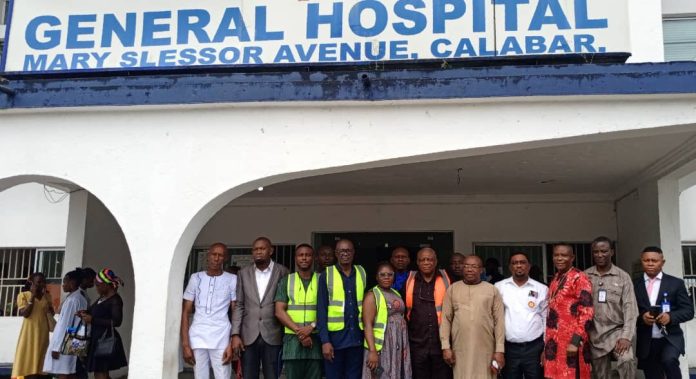Calabar –A recent inspection visit to the General Hospital Calabar (GHC) by the Cross River State Health Quality and Anti-Quackery Committee (a committee constituted by the state ministry of health) has uncovered significant challenges in the hospital’s operations and infrastructure. The visit, led by Dr. Effiong Mkpanam the leader of the Southern Zone of the committee, aimed to assess patient care quality, ensure compliance with standards, evaluate infrastructure and facilities, review staff qualifications, and improve overall health standards. The inspection team was received by Dr. Kenneth Takim, the Medical Superintendent NEGROIDHAVEN has garnered.
During the visit, the team inspected several key departments, including the pharmacy, consulting room, pediatric room, casualty, laboratory, collection unit, sample collection unit, radiography, and post-natal ward. The findings highlighted several pressing issues that need immediate attention.
After the inspection, Dr Mkpanam disclosed the hospital is facing a critical shortage of specialists, particularly in the department of laboratory science and pathology, which is affecting the quality of care and efficiency of operations. Additionally, several essential machines are nonfunctional due to insufficient maintenance, notably the X-ray machine in the Radiography Department. There is also no water supply in the post-natal unit, and the medical wards are in dire need of repainting.
The inspection further disclosed that the hospital’s waste management systems are inadequate and require significant improvement. There is a need for better lighting and a comprehensive revamp of the hospital compound to ensure a safe and conducive environment for both patients and staff. Furthermore, the hospital is grappling with high costs associated with power supply, diesel/fuel, and maintenance of security, which are straining its limited resources.
Personnel issues are also a major concern, with a limited availability of skilled manpower compounded by high salary payments for locum doctors and casual staff, and generally poor staff remuneration.
Based on these Committee’s findings, the committee has proposed several recommendations. According to Dr Mkpanam, ‘The government should take over the hospital’s security, funding, and the burden of power supply to alleviate the financial strain on the hospital. There is an urgent need to repair or replace the X-ray machine in the Department of Radiography, and immediate repair of dilapidated infrastructure and replacement of damaged hospital equipment is also essential.
‘The government should engage more skilled manpower to address staffing shortages and improve the quality of care. Additionally, increasing revenue generation and improving staff remuneration are crucial to enhancing hospital operations and ensuring the sustainability of its services.’
The inspection concluded with a group photograph attended by 16 individuals, including Dr. Dan Abubakar, the state coordinator and Hon. Grace Bassey the secretary of the southern zone of the committee. Dr. Kenneth Takim expressed sincere gratitude to Sen. Bassey Otu, the Executive Governor of the State, for his initiatives in the healthcare sector, particularly in providing palliative care to pregnant women, children under five, and the elderly. According to him, these efforts have significantly improved the lives of these vulnerable groups, who now receive essential care free of charge.









